Category: Depression/Mental illness/Substance Abuse
Posted by Dr. El - May 18, 2015 - Business Strategies, Customer service, Depression/Mental illness/Substance Abuse, Engaging with families, Motivating staff, Talks/Radio shows
Join Dr. El
Wednesday, May 20th
at 2pm Eastern Time (1pm Central Time)
for a
FREE Webinar on
9 Ways to Improve the Effectiveness of your Social Work Department
& Increase LTC Resident Satisfaction
sponsored by EmLogis
To register:
About the webinar:
Are your residents depressed, their families distressed, and your staff turnover rate higher than you’d like? Empower your long term care social service department to lead the way to change! Join LTC expert and psychologist Dr. Eleanor Feldman Barbera for a live webinar on Wednesday, May 20, 2015 at 1pm CDT | 2pm EDT as she discusses the importance of social workers and ways in which an effective department can transform your community.
What you will learn:
The most important factors contributing to resident satisfaction
The impact of social workers upon resident, family and staff satisfaction
9 easy-to-implement strategies to develop your social work department
Who should attend this webcast:
Administrators and assistant administrators
DONs, ADONs, social workers
Staff training coordinators
Human resource department staff
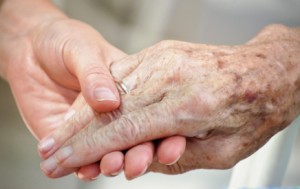
Posted by Dr. El - April 28, 2015 - Depression/Mental illness/Substance Abuse, McKnight's Long-Term Care News, Talks/Radio shows
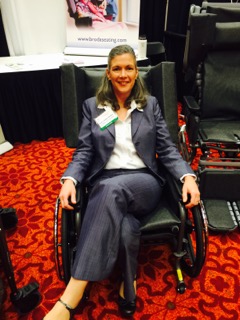
Here’s my latest article on McKnight’s Long-Term Care News:

Given that the bulk of my prior knowledge of Oklahoma came from a 72-year-old musical performed by my class during grade school, I wasn’t quite sure what to expect when I arrived in Norman for the 2015 Oklahoma Association of Health Care Providers/Oklahoma Assisted Living Association conference.
The upshot (based on the journey between the airport and the hotel): No fringed surries. Plenty of flat, open, grassy expanses. Chain stores. A bustling well-run conference. Animated conversations with attendees invested in providing enhanced care for their residents. Life-altering products in the Expo Hall.
Younger adults in senior living
I was invited for two talks, the first of which was on younger adults in senior care. The group focused on ideas for handling the challenges of younger residents, from those with illnesses such as ALS or spina bifida to people who led rough lifestyles prior to the disabling injuries (e.g. gunshot wounds) that led to placement in long-term care.
The talk addressed the emotional reactions caregivers have toward younger residents that can make it more difficult to work with them than with the typical older population. It also got into ways of unifying the team through training and policies, and strategies to engage younger residents in positive activities.
As I wrote in this 2008 article, meeting the needs of our younger residents now will help prepare our facilities for the differing expectations of the coming Baby Boom generation.
Addressing mental health in LTC
My second presentation focused on the need to address mental health problems in long-term care. Not a week goes by without a news story about a behavioral health problem in one of our facilities, such as an assault by a resident on a peer or staff member.
I offered a three-tiered model for addressing mental health care as part of our general healthcare. None of the three tiers — engaging mental health professionals, creating a healing emotional environment, and improving customer service — cost anything more than staff training and increasing the priority paid to behavioral health issues. Well worth it to avoid being the next facility with a negative news headline.
Rocking the expo hall
Between talks, I visited the expo hall in search of exhibits that offered solutions for my residents.
The first thing that caught my eye was the mod-looking geri-recliner.
For the entire article, visit:
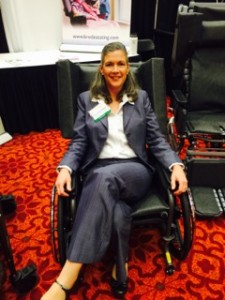
Posted by Dr. El - April 15, 2015 - Depression/Mental illness/Substance Abuse, McKnight's Long-Term Care News, Resident care

Here’s my latest article on McKnight’s Long-Term Care News:

The elevator opened up to the third floor of the skilled nursing facility. Wheelchair-bound residents lined the hall across from the nursing station, some silently watching the staff, some snoozing.
On the second floor of the nursing home, the physical layout was exactly the same but the atmosphere was completely different. Groups of two or three residents were chatting animatedly, commenting wryly on their observations of staff and laughing amongst themselves.
How do we get from Scenario A to Scenario B more often? Is it worth the effort?
The high cost of loneliness
A recent study showed that community-dwelling seniors visited their doctors more often when they were lonely — the trips to medical offices were an important but costly form of social interaction. Similarly, one might speculate that socially isolated residents request help from their nurses, aides and other workers due to feelings of loneliness in addition to addressing specific care needs.
Reducing loneliness among residents would, therefore, contribute to more staff time being available for medically necessary care.
Decreased turnover
The findings from another study suggest a connection between happier residents and staff retention. Researcher Barbara Parker-Bell, PsyD, LPC, ATR-BC, finds that “nurses consistently described the best and most satisfying aspects of dementia care as … the pleasure of seeing residents calm and engaged.”
I know from my own experience that it’s much more uplifting to step onto a unit with laughter than it is to work on a floor where the residents are depressed, lonely and withdrawn. And, of course, it’s better for the residents and their families.
Beyond ‘recreation’
Good therapeutic recreation programs are essential in reducing isolation, providing meaningful ways of spending time and in developing friendships. They’re an important step in reducing loneliness, but are also only one piece of the puzzle.
If all staff members consider the social aspects of the environment — one of the best selling features of life in LTC — we can create friendly, engaging interactions that build upon and extend formal recreation programs.
Challenges to interacting
For the entire article, visit:

Posted by Dr. El - August 13, 2014 - Aunt Sylvia, Depression/Mental illness/Substance Abuse
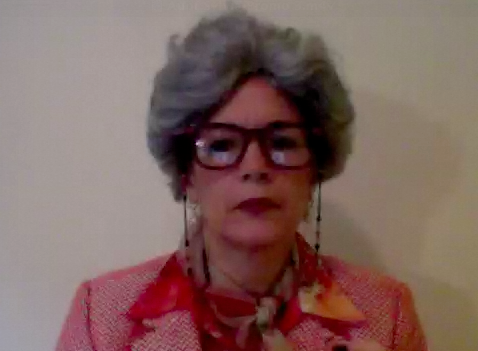
Older adults are not included in the Substance Abuse and Mental Health Services Administration’s (SAMHSA) strategic plan, and Aunt Sylvia has something to say about that!

Posted by Dr. El - May 15, 2014 - Customer service, Depression/Mental illness/Substance Abuse, McKnight's Long-Term Care News, Medication issues, Resident care
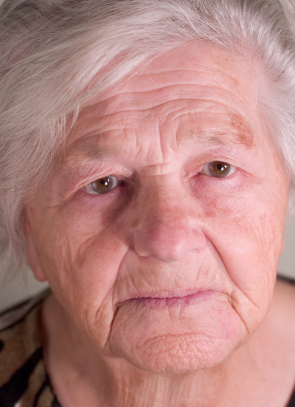
Here’s my latest article on McKnight’s Long-Term Care News:

“My mother was kicked out of her nursing home again,” my cousin told me. “They said they couldn’t handle her.” I phoned Cousin Belle’s new number in the afternoon.
“They didn’t give me my pain medication,” she said angrily. “They took away my walker and I need to use the bathroom. CAN SOMEBODY GET ME MY WALKER – I NEED TO USE THE BATHROOM!” She began sobbing. I heard another voice. “Did you hear what the man next to me just said?…You’re not a man?.. .I’m sorry, I can’t see…” Belle lost her vision several years ago, just like her father before her. “I helped people all my life,” she told her companion. Belle is a retired nurse.
She shouted again and I heard a staff member say, “Have some respect for the other residents.” Belle responded immediately, “Have some respect for me!”
“Let’s say the ‘Serenity Prayer,’” I suggested. “OK, let’s,” Belle agreed immediately. When we finished, she asked to say it again. She sounded calmer. “The woman next to me said it with me,” she remarked.
That story is about Cousin Belle, but it’s also the story of Gerry, Anna and a host of other residents I’ve seen over the years. Below are some suggestions for handling these challenging residents, coming from my perspective as a psychologist. I know there are many educated, experienced and compassionate people from other disciplines who will read this. If you have any additional tips, please add them in the comments section.
- Start afresh: If the current staff members are burned out and no longer responding well to the resident, it can be helpful to move the resident to a new unit or facility with a clean slate and fresh expectations. Notify the new team in advance so that they can prepare for the anxious resident and avoid repeating the same situation.
- Keep in close contact with the psychiatrist: The very anxious resident is likely to need medication for anxiety or depression, or at least to know that something is available if necessary. The early, frequent and regular attendance of the psychiatrist can reassure the resident and the team that an expert presence is guiding care.
- Give meds quickly: If residents are in pain or on a medication upon which they’ve become dependent, give the medication as soon as possible. Waiting will only increase their agitation and disturb other residents.
- Mollycoddle: A loud and anxious resident is likely to become louder and more anxious the longer they have to wait for their demands to be met. Just like with the medication, attend to their needs as soon as possible. Anxious people tend to be anxious because they feel out of control. Meeting their needs helps them feel more in control.
- Assign your most patient and compassionate aides: Satisfying a very anxious resident’s demands can be a never-ending task. Try to assign the type of person who will approach each call for assistance with a pleasant demeanor and not those who will let their displeasure be known with an unkind word or expression.
For the entire article, visit:
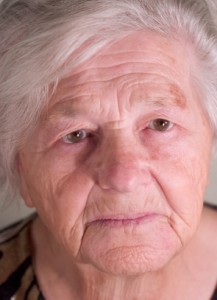
Posted by Dr. El - May 1, 2014 - Bullying/Senior bullying, Depression/Mental illness/Substance Abuse, McKnight's Long-Term Care News, Younger residents

Here’s my latest article on McKnight’s Long-Term Care News:

News of the recent double-homicide in a Houston nursing home arrived the morning I was to speak to a group gathered to address the needs of younger residents in long-term care. It didn’t escape anyone in the audience how serious this topic is — the alleged murderer is 56 years old and one of his two victims was 50 years old.
What can organizations do to respond to this terrible news and to reduce the chances that a similar situation could happen in their facilities? Plenty.
Calm fears
· Soothe nerves by pointing out efforts your facility takes to address agitated residents and maintain the safety of the environment (for example, the security guard, video cameras, separating residents in conflict, etc.)
· Minimize the news coverage of the event in common rooms. Residents who want to find out more information can read the newspaper or watch TV privately. It’s not helpful for most residents to listen to an anxiety-provoking rehash of information, especially when they’re unable to get up and leave the room.
Train staff
· Train staff to recognize signs of distress and mental illness in residents and have a system in place that allows the information to be communicated effectively. Aides, for example, don’t have to make a mental health diagnosis; they just need to be able to recognize when a resident is behaving differently and communicate it to the nurse. Train nurses to recognize the importance of the information and to work with the team to assess the resident and intervene appropriately. Mental health issues should be addressed as seriously as physical health concerns and staff should have enough training so that they feel comfortable doing so.
· Train your staff on how to defuse verbally and physically aggressive situations. Staff members without proper training often inadvertently precipitate conflict. (For more on this, download my free report, Stop Agitating the Residents, at MyBetterNursingHome.com.)
For the entire article, visit:

Posted by Dr. El - April 21, 2014 - Business Strategies, Customer service, Depression/Mental illness/Substance Abuse, Resident care, Talks/Radio shows, Younger residents

Join Dr. El this Thursday in Connecticut!
The Connecticut Association of Health Care Facilities
is sponsoring a talk on
Meeting the Needs of Younger Residents
Thursday, April 24th, 2014 at 9am
at the Crowne Plaza Hotel in Cromwell, CT
For more information and to register: CAHCF.org

Posted by Dr. El - April 17, 2014 - Depression/Mental illness/Substance Abuse, McKnight's Long-Term Care News, Psychology Research Translated, Resident care

Here’s my latest article on McKnight’s Long-Term Care News:

Research shows that the rate of depression among elders in senior residences is 24% to 27%. It’s not that every fourth resident you greet in the hallway is depressed.
It’s that we should be more concerned about the people who aren’t in the hallway to greet.
“Depressive symptoms are expected to become a leading cause of the global burden of disease, second only to cardiovascular disease, by the year 2020,” according to Tracy Chippendale, PhD, OTR/L in her 2013 Clinical Gerontologist study.”
Depressed residents are less independent in their activities of daily living, have a decreased quality of life, and tend to use more medical services than peers who aren’t depressed.
Factors reducing depression
According to Chippendale, elders with more education, better self-rated health and more social support are less likely to be depressed. While we can’t necessarily change a person’s health or the level of education they’ve achieved, as senior care providers we can certainly offer opportunities for social support.
An important component of social support — beyond the number of connections in a person’s life — is how much the individual feels valued by others. For a retired elder who has completed raising her children and lost the value of a job and its contacts and income, mattering to others can come from family relationships, friendships, community service, and owning a pet, for example. Studies suggest that moving to a senior residence can reduce some of these opportunities to connect and to be of service.
Creating opportunities to ‘matter’
For the entire article, visit:

Posted by Dr. El - March 6, 2014 - Business Strategies, Depression/Mental illness/Substance Abuse, McKnight's Long-Term Care News, Resident care
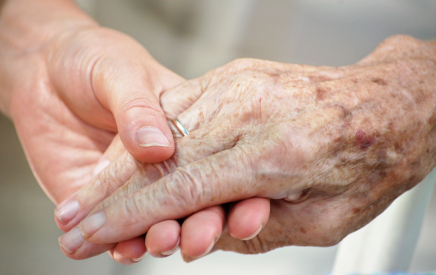
Here’s my latest article on McKnight’s Long-Term Care News:

I was speaking about leadership to a group of administrators recently when the discussion turned to person-centered care. “Culture change, the Eden Alternative, whatever you call it,” I said, “things are moving in that direction. MDS 3.0 has the team asking residents questions that staff members would have answered in the past, such as whether or not residents feel depressed.”
We talked about the impact of this and I continued, “In my experience, the nursing home I worked in that was most attentive to the psychosocial needs of the residents was the one that was in the process of becoming an Eden Alternative home.”
I’m not in any way affiliated with the culture change movement, but I certainly noticed the difference in the atmosphere in the Eden facility and its impact on the residents’ mental health. In traditional facilities, an enormous amount of the residents’ psychotherapy time is devoted to addressing how to work in or around the nursing home system if possible, and how to maintain their equanimity and sense of humor if not. This was less of a focus for residents in the Eden home.
When I work with the staff in a traditional nursing home, I’m often an emissary of the residents, delivering their messages in a way that can be heard by the staff. In the Eden facility, there are more emissaries and more people listening to what the residents have to say in the first place. Being heard is essential for good mental health.
For the entire article, visit:
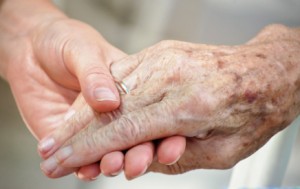
Posted by Dr. El - September 20, 2013 - Business Strategies, Common Nursing Home Problems and How Psychologists Can Solve Them, Depression/Mental illness/Substance Abuse, McKnight's Long-Term Care News, Role of psychologists, Transitions in care

Here’s my latest article on McKnight’s Long-Term Care News:

Of the most efficient countries for healthcare, the United States ranks second in healthcare costs per capita but 46th in efficiency (out of the 48 countries ranked!). The move from a biomedical to a biopsychosocial model of healthcare might be able to change that.
Consider the following scenario: Estelle’s fall at home sent her to the hospital. She was diagnosed with a hip fracture and diabetes and transferred to the nursing home for short-term rehab. A biomedical model would treat both conditions and send her home again. A biopsychosocial model would also address her need to make dietary changes, her fears of falling again, the alcoholism that contributed to both her diabetes and her fall, and her noncompliance with the rehab staff.
From biomedical to biopsychosocial
In her American Psychological Association presidential address, psychologist Suzanne Bennett Johnson discussed the change from a biomedical model of care to a biopsychosocial model of healthcare. The biomedical model of care that has “dominated Western medicine … for over 100 years” focuses solely on biologic factors to understand illness. It’s resulted in cures for infectious illnesses such as tuberculosis, pneumonia, and influenza, and increased life expectancy from 49 years in 1901 to 77 years in 2001. The biomedical model has been a great success in many respects.
As Johnson points out, however, “while infectious disease was the leading cause of death in 1900, today most Americans die of chronic disease: heart disease, cancer, chronic lower respiratory diseases, and stroke.”
Underlying these diseases are behaviors such as smoking, poor dietary habits, sedentary behavior, and substance abuse. In addition, she notes, “as many as 40% of medical patients are co-morbid for a mental health disorder and as many as 75% of seriously mentally ill patients are co-morbid for a physical health disorder.”
Implications for LTC
Clearly, in order to reduce chronic disease in this country (and to decrease medical costs), we need to address the behaviors – the psychological and social factors — underlying the diseases. But we work with elders, you might say, the damage caused by years of poor self-care has already been done! Perhaps.
But as a psychologist talking with seniors over the years, I’ve found that many of my lovely old dogs were ready for new tricks. We need to intervene, however, in certain key ways:
For the entire article, visit:



















